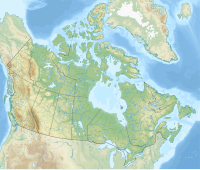Caldron Peak (original) (raw)
From Wikipedia, the free encyclopedia
Mountain in Alberta, Canada
| Caldron Peak | |
|---|---|
 Caldron Peak and Peyto Lake Caldron Peak and Peyto Lake |
|
| Highest point | |
| Elevation | 2,911 m (9,551 ft)[1] |
| Prominence | 449 m (1,473 ft)[2][note 1] |
| Parent peak | Mistaya Mountain (3096 m)[2] |
| Listing | Mountains of Alberta |
| Coordinates | 51°43′08″N 116°32′42″W / 51.71889°N 116.54500°W / 51.71889; -116.54500[3] |
| Geography | |
  Caldron PeakLocation in AlbertaShow map of Alberta Caldron PeakLocation in AlbertaShow map of Alberta  Caldron PeakLocation in CanadaShow map of Canada Caldron PeakLocation in CanadaShow map of Canada |
|
| Location | Banff National ParkAlberta, Canada |
| Parent range | Waputik RangeCanadian Rockies |
| Topo map | NTS 82N10 Blaeberry River[3] |
| Climbing | |
| First ascent | 1948 FRA: C. Beattie and an ACC party |
Caldron Peak is a 2,911-metre (9,551 ft) mountain peak of the Waputik Range, located in Alberta, Canada.[1][2] It is prominently visible from the Peyto Lake Overlook in Banff National Park.
It was named after Caldron Lake which is 3 km (1.9 mi) from its summit.
Like other mountains in Banff Park, Caldron Peak is composed of sedimentary rock laid down during the Precambrian to Jurassic periods.[4] Formed in shallow seas, this sedimentary rock was pushed east and over the top of younger rock during the Laramide orogeny.[5]
Based on the Köppen climate classification, Caldron Peak is located in a subarctic climate with cold, snowy winters, and mild summers.[6] Temperatures can drop below -20 C with wind chill factors below -30 C. Precipitation runoff from Caldron Peak Peak drains into the Mistaya River which is a tributary of the North Saskatchewan River.
- ^ a b "Caldron Peak". cdnrockiesdatabases.ca. Retrieved 2019-08-11.
- ^ a b c "Caldron Peak". Bivouac.com. Retrieved 2019-08-26.
- ^ a b "Caldron Peak". Geographical Names Data Base. Natural Resources Canada. Retrieved 2019-08-26.
- ^ Belyea, Helen R. (1960). The Story of the Mountains in Banff National Park (PDF). parkscanadahistory.com (Report). Ottawa: Geological Survey of Canada. Archived (PDF) from the original on 2015-10-02. Retrieved 2019-09-13.
- ^ Gadd, Ben (2008), Geology of the Rocky Mountains and Columbias
- ^ Peel, M. C.; Finlayson, B. L.; McMahon, T. A. (2007). "Updated world map of the Köppen−Geiger climate classification". Hydrol. Earth Syst. Sci. 11 (5): 1633–1644. Bibcode:2007HESS...11.1633P. doi:10.5194/hess-11-1633-2007. ISSN 1027-5606.
Footnotes
- ^ Based on an elevation of 2909 m